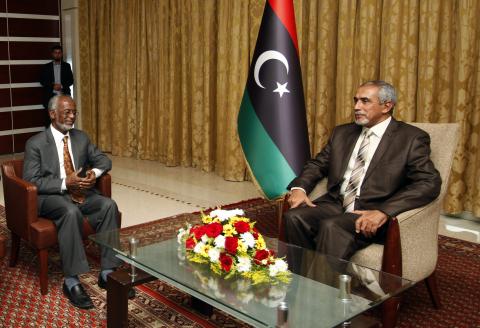Advertisement
Struggle over Libya's oil risks breaking up country: rival PM
TRIPOLI (Reuters) - Libya's self-proclaimed prime minister has warned that attempts by a rival government in the east to assert control over the oil industry could escalate the political conflict dividing the OPEC member state and force it to break in two.
Libya has had two governments competing for power since August when a group called Operation Libya Dawn, which opponents say is backed by Islamists, seized Tripoli and forced the elected Prime Minister Abdullah al-Thinni to flee 1,000 km to a small city near the border with Egypt.
Both sides have so far avoided talking publicly about prospect of a split.
The warning by Omar al-Hassi, prime minister of the rival government, came after Thinni's government claimed air strikes on Tripoli's Mitigate airport this week, escalating a confrontation that started with an attack by Libya Dawn on a rival force in Tripoli in July.
The new rulers in the capital are not recognized by the United Nations and world powers but have taken over ministries, oil facilities, airports and much of western and central Libya.
In a step to assert control over the oil industry, Thinni's government said on Wednesday it had appointed a new chairman of the National Oil Corp. Thinni had initially retained the state oil firm's previous head, Mustafa Sanallah, but he remains in Tripoli.
The conflict gripping Libya three years after the overthrow of Muammar Gaddafi poses a legal dilemma for oil traders, who are left wondering who owns Libya's oil exports, worth more that $10 billion a year. The country sits on Africa's largest oil reserves.
"Libya's oil has become part of the war," Hassi told Reuters in an interview. "We had hoped that oil would not be part of this conflict."
Hassi said Libya might break up if the international community allowed Thinni to appoint its own NOC chairman and eventually form an eastern oil company.
FUTURE PROBLEM
"Helping to create a new oil company means helping to break up Libya," Hassi said late on Thursday, sitting in Thinni's old office. "The West will be responsible for this problem in the future."
Hassi said the NOC appointment was an attempt to take over oil facilities in the east with the help of a former general, Khalifa Haftar, whose armed group has merged with the army in the east to fight enemies he describes Islamists.
"There are attempts (by Thinni) to set up an eastern Supreme Court, there are attempts to launch a central bank in the east, there are attempts to establish a separate oil ministry in the east," said Hassi, who said he was against partition.
Thinni's government has sought to move heads of state-run institutions to the east as he is recognized by the international community, but he too denies any plans for secession.
But Hassi said Thinni's government had shown it intended to control oil facilities in the eastern rump state by picking al-Mabrook Bou Seif as new NOC Chairman, since he was from the same tribe as Ibrahim Jathran, a former rebel leader who seized eastern ports for a year to press for regional autonomy.
Jathran, who reopened the oil ports in April in a deal with Thinni's government, has said he will push for eastern secession if the world recognizes Hassi's government.
Hassi said OPEC had contributed to the escalation by refusing to invite his oil minister, Mashallah Zwai, an invitation to a meeting on Thursday attended by Thinni's delegation.
Hassi said Turkey might mediate between the two sides as it had a direct interest due to its large business interests in Libya. The United Nations has started a dialogue but talks have gone nowhere, diplomats say.
"Everybody respects Turkey. Turkey wants a quick solution to Libya's problem so it can start investing. The Turkish state thinks of the economy," Hassi said.
"Turkey uses quiet language, good language and demonstrates good political thinking. It gives both sides the chance for dialogue, which is very important," he said. "They think in a balanced way."
Turkey is one of the few countries to have met top Hassi officials publicly. Ankara, which has also good relations with Thinni, had also invited Zwai to a business forum.
"We are open to dialogue," said Hassi. "This conflict cannot be solved by war."
(Reporting by Ulf Laessing; Editing by Giles Elgood)



















Add new comment